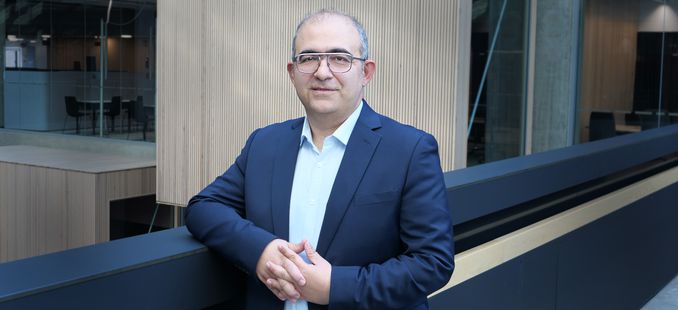
Versatile researcher: Amin Majd knows the intricacies of artificial intelligence and autonomous vehicles
Amin Majd works as a Senior AI Specialist in Turku University of Applied Sciences' Wireless communication and cybersecurity research group. His area of expertise is autonomous vehicles, such as drones and maritime transport.
Text and photo: Siiri Welling
Artificial intelligence researcher Amin Majd from Turku University of Applied Sciences started his impressive research career twenty years ago. At that time, he started as a project manager at a high-tech company in Kerman, Iran. Majd, who studied computer science, became familiar with artificial intelligence, autonomy, and algorithms, which led to doctoral studies in Finland. But unlike other researchers, Majd completed two doctoral studies at the same time.
“The reason was that I found two very interesting dissertation subjects. After talking to my supervisor, I realised that doing two doctoral dissertations is challenging, but not impossible. So, I decided to do two doctoral dissertations, which were completed within about five years", says Majd.
A doctoral dissertation at the University of Turku was related to optimization and another, a doctoral dissertation at Åbo Akademi University, focused on navigating a swarm of autonomous vehicles. Through the DIANA project, Majd developed a framework that enabled safe and efficient navigation for many different vehicles or passengers on different means of transport. Similar software did not exist.
“The idea came from drones. An autonomous drone moving alone may not be successful, as it still needs to be controlled at times. But if it is possible to control several drones autonomously at the same time, we can intensify border control, for example. The aim is to create an intelligent, dynamic network in the sky, the position of which can be changed to control a swarm of drones, or why not some other means of transport”, says Majd.
Amazing dataset from the Turku archipelago
With the drone and optimization, Majd also became more interested in autonomous traffic and vehicles. Currently, he is part of Turku University of Applied Sciences' Wireless Communications and Cybersecurity research group and works in the ARPA and Tehoteko projects. The latest of these launched an autonomous vessel at the beginning of June to collect data on maritime traffic and develop autonomous traffic. Majd has developed the artificial intelligence used on board the vessel. For example, he has collected a huge amount of image data from Archipelago Sea for the project.
“We now have the largest and most comprehensive open annotated dataset on marine environments. Our data includes 120,216 RGB images, 53,108 stereo images, 60,108 multi-view images, 36 hours of LiDAR data and 24,302 drone images. In addition, we used GAN networks to create synthetic image data that simulated different weather conditions. As a result, we produced 1,322,726 synthetic and annotated images. We used this data to train neural networks to detect objects and develop a depth detection algorithm based on stereo vision cameras", says Majd.
Amin Majd believes that full autonomy in maritime transport will be possible within four years. He points out that autonomy is not meant to replace the work done by a real person. Autonomy, on the other hand, can make the work easier and prevent mistakes caused by, for example, human factors such as fatigue. But even if technology enables autonomy in maritime transport, legislation usually follows suit. The same applies, for example, to the autonomy of public transport.
“At the moment, the problem in public transport is data collection and how data can be combined. Trams could perhaps be made autonomous faster than, say, bus traffic, as it could be easier to collect data on trams running on rails. Of course, taking other traffic into account can also slow down and complicate the development of autonomous public transport”, Majd ponders.
Artificial intelligence and diverse research
In his spare time, Majd spends time with his family and occasionally plays guitar and Persian tar. However, AI matters may follow him home as well, as his spouse also works with AI issues at Turku University of Applied Sciences. Although artificial intelligence is still generally considered weak now, Majd believes that it will develop rapidly in an even better and more efficient direction.
“In AI development, it is important to find enough high-quality data. But another important thing is mathematical skills, which must be invested in both teaching and artificial intelligence: behind the functionality of artificial intelligence, there is high-quality mathematics, and if we want to develop artificial intelligence to be better, we must also know high-level mathematics.”
Majd has been working at Turku University of Applied Sciences for about a year now. He praises the atmosphere and how well he has been accepted into the work community. He also praises the way of conducting practical research: for someone accustomed to theoretical research at universities, it has been a pleasure to test theory in practice as well.
“We are a hands-on university, and we have access to devices and sensors. Thus, it will be easier to see the trace of work. Students also quickly get to grips with the work themselves and learn complex things in practice. That is a very good thing.”
In addition to artificial intelligence and autonomous transport, Majd has researched topics related to robotics and health technology. Majd admits that he is interested in many different things, as to some extent, they are all related.
“For me, these things also support each other. Of course, in the big picture, it is good to study one large entity, but within the big picture, it is good to occasionally explore some other direction or path. It can be used to find inspiration or solutions to the original problem. Diverse knowledge helps create better solutions”, says Majd.